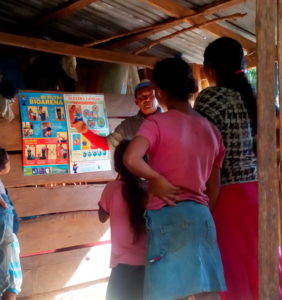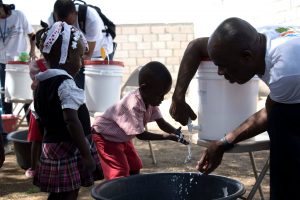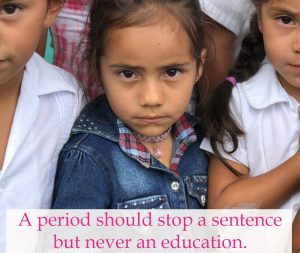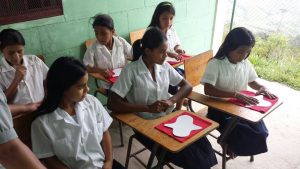How does hygiene education help to ensure sustainable access to safe water? And, how does PWW integrate it into programs?
As World Water Day, March 22nd, comes closer, we want to provide you with insights about what goes into implementing sustainably safe water programs in underserved communities. You can access our series of blogs for World Water Day 2019 by clicking here.
 Providing safe drinking water goes hand-in-hand with teaching healthy hygiene practices, as clean water can be very easily recontaminated if unsafe practices are being used. Hygiene education includes teaching practices for keeping our bodies, our homes, and our natural surroundings clean.
Providing safe drinking water goes hand-in-hand with teaching healthy hygiene practices, as clean water can be very easily recontaminated if unsafe practices are being used. Hygiene education includes teaching practices for keeping our bodies, our homes, and our natural surroundings clean.
Personal hygiene education is one of the most powerful barriers to stopping the spread of diseases that can be carried through water. Hands are a main vessel for carrying bacteria, so teaching a simple, yet effective, hand-washing practice, using clean water and soap, if possible, is essential. Additionally, teaching the dangers of open defecation can reduce, and even eliminate, the spread of pandemic waterborne diseases (such as cholera).
 Hand-washing with soap is a foundational component of healthy schools. Good hygiene practices help ensure children are healthy, so they can attend class and learn. Globally, children miss a cumulative 272 million schooldays each year due to diarrhea, and hand-washing with soap has been found to help reduce school absenteeism that is caused by diarrhea, influenza and conjunctivitis by up to 50%. (source)
Hand-washing with soap is a foundational component of healthy schools. Good hygiene practices help ensure children are healthy, so they can attend class and learn. Globally, children miss a cumulative 272 million schooldays each year due to diarrhea, and hand-washing with soap has been found to help reduce school absenteeism that is caused by diarrhea, influenza and conjunctivitis by up to 50%. (source)
Through home and environment hygiene training, PWW helps families to gain an awareness of the risks that human water pollution causes, and it teaches families how to proactively reduce pollution by taking preventative measures, such as keeping the surroundings around their homes, schools, and fields clean. The training also includes the proper construction, use, and maintenance of sanitation facilities, which further prevents dangerous water contamination.
PWW hygiene education programs teach healthy practices by using interactive group discussions, games, posters, and demonstrations. What’s more, the hygiene education program is sustainable because the PWW training teams provide local leaders, educators, and community health promoters with the tools and education to replicate the WASH (water, sanitation and hygiene) trainings and to organize community awareness and mobilization campaigns themselves. This approach allows the WASH trainings to become regular, integrated practices in the communities.
When the winds come and the rain falls onto the earth, a portion of the precipitation will seep into the ground to replenish the Earth’s groundwater and the rest will flow downhill as runoff. Runoff is extremely important because not only does it keep rivers and lakes full of water, but it also changes the landscape through the action of erosion and the spread of pollutants. Teaching families and communities how to safely maintain their environment can help to reduce the transfer of pollutants, which, in turn, helps to prevent the spread of waterborne pathogens.
In addition to basic hygiene education, our teams in Haiti and Honduras have integrated Menstrual Hygiene Education into the WASH training programs. With 2.1 billion people lacking access to safe water at home and 4.5 billion lacking access to safely managed sanitation, adolescent girls and women around the world who fall into these statistics have even greater challenges to their general health and wellbeing, as it is almost impossible for them to manage their menstruation in a private, safe, hygienic way.
 Girls around the globe are missing school during their monthly cycle, an entire week each month, due to a lack of proper facilities in schools, including a lack of privacy and menstrual supplies. Almost 25% of a girl’s life is spent managing menstruations, so this has a huge impact on a girl’s access to education and future. This issue not only affects female students but also female teachers, administrators and staff, creating a widespread impact on the whole school system.
Girls around the globe are missing school during their monthly cycle, an entire week each month, due to a lack of proper facilities in schools, including a lack of privacy and menstrual supplies. Almost 25% of a girl’s life is spent managing menstruations, so this has a huge impact on a girl’s access to education and future. This issue not only affects female students but also female teachers, administrators and staff, creating a widespread impact on the whole school system.
Good menstrual hygiene requires girls and women to be empowered with:
- The education to effectively manage their menstrual cycles;
- Safe facilities to use the bathroom, including a means to wash hands with soap;
- Safe menstrual products;
- A knowledge of how to safely clean and/or dispose of used menstrual products.
PWW’s menstrual hygiene education program includes training in both groups and one-on-one discussions, allowing the girls to share their private concerns and difficulties with managing their menstruations. It also gives boys an opportunity to learn about their own puberty changes and a girl’s menstrual cycle, as well as talk more about gender equity.
 PWW provides girls and women with the training to make their own sustainable/washable menstrual supplies and teaches them how to safely clean them, to further protect water sources.
PWW provides girls and women with the training to make their own sustainable/washable menstrual supplies and teaches them how to safely clean them, to further protect water sources.
PWW WASH programs in schools include the construction of appropriate gender-specific toilets/latrines, equipped with hand-washing stations and trash bins. Thanks to this program, girls in schools that PWW has served are feeling confident about going to school during their menstrual cycles, breaking down previous barriers and opening new doors to their future.
Proper hygiene practice education is the essential foundation to a truly sustainable safe water program.
Have questions? Contact us at info@purewaterfortheworld.org.
If you want to help reach World Water Day’s 2019 goal of “leaving no one behind” please consider making a donation. Just $25 brings a lifetime of clean water for one child; $300 changes the future for an entire family. Donate here.
